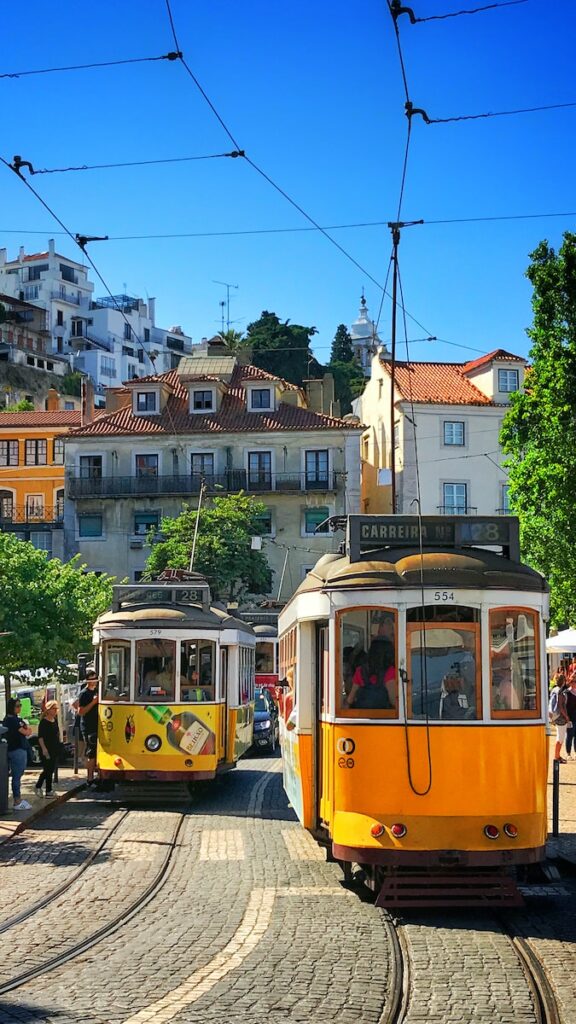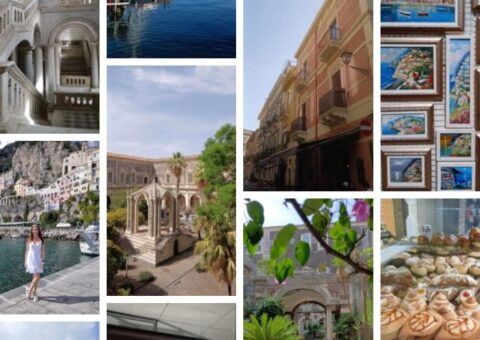The Ultimate Guide to Relocating to Lisbon
Coming up: accommodation options, cost-of-living statistics, traditional Fado, smiling locals, and endless reasons to relocate to Lisbon.
So, you’re thinking about moving to Lisbon.
Nice choice! Give yourself a pat on the back from us.
But you probably have some unanswered questions:
How do I find accommodation? Where can I get a job? Should I expect any culture shocks? What’s the healthcare like? Do I need to learn Portuguese? And how are these delicious little egg tarts so ridiculously tasty?
Well, in this guide, we’ve covered all that and more…
… and we’ve brought you everything you need to know about moving to Lisbon and living in Lisbon.
Today, your relocation-loving friends at Homelike are taking you on an informative multi-stop tour around Portugal’s lovely capital. Bring your passport and come join the fun!
Why Move to Lisbon?
Some of the top reasons for relocating to Lisbon include:
- Warm year-round weather: summers are HOT, spring and fall are warm, and even winters are pretty tolerable. Average January temperatures sit at around 11°C (52°F).
- Affordable prices: okay, Lisbon isn’t quite as affordable as it once was—but compared to most other major western European cities, life here is pretty low-cost. Consumer prices (including rent) in Lisbon are 42.5% lower than in London. And consumer prices (including rent) in Lisbon are 22.5% lower than in Berlin.
- World-class nightlife: you’ll find late-night clubs playing techno, pop and dubstep… but you’ll also find traditional tucked-away spots, where drinkers spill out onto the streets. Other nightlife highlights include cafes that become bars, and lots of live Fado music (which originates from the city!). Nights out here are some of the best on the planet.
- It’s right on the sea! You’ll find brilliant beaches within a 15-minute drive—and plenty of them are easily accessible with public transport. And right in the center of the city, you’ll also find some short promenade areas for walking, cycling and running along the shore.
- Lots of nearby hiking: you can use public transport to quickly reach Parque Florestal de Monsanto, a hefty national forest with hiking and biking trails. Further-afield options include the massive (and coastal) Sintra-Cascais Natural Park, and tucked-away hikes in rural areas north of Lisbon.
- It’s close to many smaller expat-friendly places: if you want to live close to a big city without living in a big city, Lisbon is one of the best options in western Europe. Outskirt districts include Parque das Nações and Belem, while further-away options include the loveable towns of Cascais (which sits on the sea), and Sintra (which lies in the hills).
- Excellent public transport, but we’ve covered all the details later.
- It’s easy to feel at home: local people are friendly, English levels are good, you’ll meet lots of other expats, and the city’s whole vibe is very warm and welcoming.
- Endless events: obviously, Lisbon has lots of tourist attractions. But once you’ve gone beyond them, you’ll also find loads of events, festivals, pop-up attractions, live music, food fun, and plenty more—on any given night, you’ll have too many options to choose from. Here’s a good place to start with finding all the fun.
Overall, for most people, the pros of relocating to Lisbon massively outweigh the cons.

Visa Requirements for Moving to Lisbon
This all depends on where you’re from.
If you’re from another EU/EEA country, congratulations: Moving to Lisbon is very easy. You don’t need any visa. All you need to do (if you want to stay longer than three months) is apply for your registration certificate at your nearest city council office (map of locations here).
If you’re not from the EU/EEA area, you might be able to enter Portugal for three months with no visa. More than 60 nationalities (including people from the UK, US, New Zealand, and Australia) can enter Portugal for 90 days with no visa. There’s a list of all the eligible nationalities on this page.
If you’re not one of the above-mentioned people who can visit for three months with no visa, you are eligible for a short-stay visa (which is valid for up to 90 days). Here’s more information.
If you want to stay for longer than 90 days (and aren’t from the EU/EEA area), you will absolutely need a visa. You have a huge number of options, but the best of them are…
- The Golden Visa, which is essentially an investment visa. You qualify by buying property, or contributing to the Portuguese economy in some other way—the most popular option is by spending €500,000 on a local property. Though this scheme might soon be canceled, it’s still a valid way to move to Lisbon for now. Take advantage while you can!
- The Retirement Visa; a good option if you have a passive income from an existing pension. If you can prove you have a steady income of €760 per month (€9,120 per year) or more, you can stay in Portugal. This is also known as the D7 visa.
- The digital nomad visa. Until very recently, most digital nomads who wanted to live in Portugal would use the D7 visa… and their income was considered to be passive income. But now, some digital nomads are having their D7 visa applications rejected… so your best option is now to apply for the new D8 visa. This D8 visa is specifically designed for freelancers, digital nomads, and remote workers.
- One of the many residency visas (which are the most ‘normal’ long-stay visas). If you want to stay in Portugal for longer than a year, and none of the above options apply to you, a residency visa is typically your best option.
… you can also apply for a temporary stay visa. These visas are available for many purposes, and usually allow you to stay for a period of more than three months, but no longer than 12 months.
Aside from the above, there are also many other types of visas, all of which are a bit more niche (including those for medical care, transiting workers, religious-related reasons, and people looking for work). To see all of those very-varied options, this official portal is the best resource.
Navigating Bureaucracy in Lisbon
Aside from your visa, you’ll have other bureaucratic things to think about after relocating to Lisbon. Some of the most immediate (and most important) include:
- Taxpayer identification number, also known as the ‘Número de Identificação Fiscal’ (NIF). You need this number to pay tax, open a bank account, register your address, and more. Book an appointment at your local tax office, or use the online portal. You can find information for both options here.
- Registering your address: also known as getting your ‘certificate of residency.’ To get this, you assemble your rental contract, your passport and your NIF, and you make an appointment at your local council office.
- Opening a bank account: the most popular ‘traditional’ banks are Millennium BCP, Caixa Geral de Depositos, and Santander. Or, to make things easier, you can open an online account (they require very little documentation to get started). The best online options are N26, Openbank, and Revolut.
- Setting up utilities: you’ll also need to think about your bills for gas, electricity, water, and internet. Or, you can just move into a serviced apartment or a serviced flat instead—these places offer a flat rate covering all costs and utilities.
Note: if you’ll be living in Lisbon for fewer than three months, you don’t need to worry about any of the above (and, apart from a possible visa, you don’t need to worry about any bureaucratic stuff at all)

Best Neighborhoods to Live in Lisbon
When moving to Lisbon, you have many potential neighborhoods to choose from.
Some of the top options include:
- Alfama: one of the oldest neighborhoods in Lisbon, and the most photogenic of them all. Living here feels like you’ve stepped into a Lisbon postcard, via a series of maze-like alleyways. It’s pricey, but it’s romantic and loveable—and it’s full of live traditional music.
- Baixa: the most touristy part of the city, and perfect for short-term stays. Expect shopping streets, tourist sights, endless restaurants, and guidebook-toting visitors.
- Bairro Alto: one of the city’s best nightlife areas, and a popular choice for party-loving young people. It offers a lovely combo of old-school vibes and new-school fun.
- Parque das Nações: around 8 km (5 miles) west of Lisbon’s very-central districts, this neighborhood sits right on the coast. It’s modern and sleek, it’s different to the rest of the city, and it has all the conveniences anyone could need. It’s a good place for raising kids.
- Cascais: a leftfield option, but a popular one. Around 30 km (18 miles) west of Lisbon, Cascais is one of the most well-known coastal towns in Portugal. Expect seafood, family-friendly adventures, loads of outdoorsy options, a small-town vibe, and even a couple of relatively-close international schools.
Top tip: we’ve covered all these districts and more in our big guide to the best neighborhoods in Lisbon.
Finding Accommodation in Lisbon
Renting an apartment in Lisbon isn’t as affordable as it once was.
Currently, you can expect to pay around 1,280€ for a 1-bedroom apartment in the city center, or 850€ for a 1-bedroom apartment outside the city center.
The best websites for finding accommodation in Lisbon include Homelike, ReMax,and Idealista. You can also use the Facebook search function, to find groups offering rentals (search for terms like ‘apartments in Lisbon,’ and you’ll find them).
Other options include living in hostels or hotels, and moving into a co-living space.
But, sadly, as you’ll probably soon find out for yourself, one of the biggest drawbacks of living in Lisbon is… finding a place to live in Lisbon.
Many digital nomads are flocking to the city, you (presumably) don’t speak the local language, and unscrupulous landlords will try to charge you extortionate sums for subpar apartments. Then, on top of all that, the good places usually get snapped up right away. In short, it’s a big ol’ struggle.
For those reasons, it’s usually easier (especially in the short-term) to move into a short term apartment or flat. With a short term rental that is fully furnished, you know exactly what you’re getting, you won’t get ripped off, and you won’t waste endless days on viewings and negotiations.
If that sounds like a juicy solution to your dilemma, we have many varied options. They’re all perfect for working and living; they’re all fully-furnished, and they’re all ready to move into right now. And on top of all that, they’re comfy, cozy and homely. You won’t find a better introduction to Lisbon.

Finding a Job in Lisbon
If you’re moving to Lisbon and you’re not a digital nomad, you’ll (presumably) need to find a job.
Some of the city’s most prominent industries are tourism, healthcare, and IT—but because this is a modern western-European capital city, you’ll find many jobs in pretty much every industry.
To hunt those jobs down, your best resources are Empregos Online, Indeed.pt (both of which are in Portuguese), Jobs In Lisbon (for English-speaking jobs), and even LinkedIn.
Obviously, if you really want to find a job, it’s best to speak Portuguese (more on that soon).
Compared to many other major western European cities, salaries are quite low in Lisbon. According to PayScale, the average annual salary in Lisbon is €29,000. According to TimeDoctor, the average monthly salary in Lisbon sits at around €2,550.
Learning Portuguese when Moving to Lisbon
You don’t absolutely need to learn Portuguese to live in Portugal…
… and if you’ll only be moving to Lisbon for a few months, you probably won’t want to.
But if you’re gonna be living in Lisbon for a while, you should learn Portuguese. You’ll make more friends, bureaucracy and daily life will become easier, and you’ll be in a better position for landing a job.
To get started, the best resource is Duolingo. It turns language-learning into a big fun colorful owl-based game.
Once you’re ready to push further, some of your best options are Babbel, Rosetta Stone (great for comprehensive detail), LingoClip (where you learn by listening to Portuguese music!), and Pimsleur (excellent for speaking and listening).
You’ll also find lots of language-learning events in the city. Hop onto Facebook, type ‘language exchange Lisbon’ (or similar) into the search bar, and you’ll find helpful events. As a nice bonus, these events double-up as a handy way to make friends. Win win!
Lisbon’s culture and people
When you’re relocating to Lisbon, you’re probably not gonna experience any massive culture shocks—this is a modern European city in a globalized world; you’re not moving to Mars.
But depending on where you’re from, things might be a little different.
Broadly speaking, the biggest features of Lisbon life include lots of live music, a focus on families, communal meals, late nights, loud streets, and a massive cafe culture (which spills out onto the streets any time of day).
From Lisbon’s people, you can expect openness, friendliness, and warmth. Generally, people are very laid-back, and life has a slow, relaxed pace. Though it can take a while to make friends here (that’s the case no matter where you move), you’ll feel immediately welcome and at-home in Lisbon.
Healthcare in Lisbon
Portugal ranked 22 in Numbeo’s mid-year 2023 Health Care Index (assembled via crowd-sourced ratings), and ranked #22 in the FREOPP 2022 World Index of Healthcare Innovation.
… so, the nation’s healthcare isn’t the very best in the world, but it’s very good.
If you want to access this healthcare while you’re living in Lisbon, you have both public and private options.
If you’ll only be around for a short while, private healthcare is the best option (and if you’re staying for a period of three months or less, private healthcare is your only option). The best insurance providers are usually the big names, like Cigna, AXA, or Allianz.
Some long-term expats prefer to use the national healthcare system (known as the ‘Serviço Nacional de Saúde,’ or ‘SNS’), which you can only use if you have legal residency. Once you have this residency, you’ll be sent a social security number (NISS). Use this social security number to register at your local health center, and you’ll be able to access the public healthcare system. Easy!
Education in Lisbon
In 2021, in the annual ‘Best Countries Report,’ Portugal ranked 25th in the world for education—and the nation is considered to be among the top 20 countries in the world for higher education.
So if you’re moving to Lisbon with kids (or to go to university), you’re in the right place.
Some of the city’s best international schools include Prime School, British School of Lisbon, and Lisboan School. If your kids are very young, you might want to place them into a Portuguese-speaking school (in which case you have endless options to choose from).
… there are also more than 30 universities in Lisbon (some general; some specialist). Some of the best include University of Lisbon, Catholic University of Portugal, and Nova School of Business and Economics.
You’ll also find lots of language schools dotted around the city, ideal if you wanna learn the language. Some of the best include Portuguese Connection, Lusa Language School, and Lisbon Language Café.
Transportation in Lisbon
Relocating to Lisbon without a car is easy—the city’s public transport is extensive, affordable, easy to use, and easy to understand.
… and you can use it to reach every pocket of the city.
You get 88 bus routes, six tram lines, four metro lines, five inner-city train lines, 5 ferry routes, three funiculars, a lift, and some reasonably good cycling routes. They’re all interconnected, so it’s easy to hop from one method of transport to another (if you need to).
To get around, get a Viva Viagem card, regularly top it up, and tap onto all forms of transport you use. As of now, a 24-hour ticket costs €6.60, and it entitles you to unlimited rides on all public transport. Here’s much more information.
Lisbon is also a pretty walkable city, with many wide sidewalks—and lots of Lisbon locals get around largely on foot (although many sections of the city are steep).
Quality of Life in Lisbon
In Internation’s 2022 quality of life study, Lisbon came 5th in a worldwide survey of expat cities. And it ranks ‘high’ on Numbeo’s quality of life index.
As we’ve covered, the city’s healthcare, education and transport are all very good. Other perks include lots of things to do, plenty of sunshine, loads of opportunities for exercise, a reasonable work-life balance, high levels of safety, ease of making friends, and a laid-back life (that places a firm focus on spending time with others).
In short, if you want a good quality of life, Lisbon is a brilliant place to live.

Cost of Living in Lisbon
Compared to many other parts of western Europe, Lisbon is relatively cheap.
(yep, it’s not as cheap as other parts of Portugal, but it’s still pretty affordable).
At the time of writing, here are the types of prices you can expect after relocating to Lisbon:
- 1-bedroom apartment in the city center: 1,280€
- 1-bedroom apartment outside the city center: 850€
- 3-bedroom apartment in the city center: 2,320€
- 3-bedroom apartment outside the city center: 1,510€
- One-way ticket on local public transport: 2€
- Regular monthly pass for local public transport: 40€
- Meal for 1 at an inexpensive restaurant: 12€
- 3-course meal for 2 people at a mid-range restaurant: 50€
- Large draught domestic beer in a bar or restaurant: 2.50€
- Regular cappuccino in a cafe or restaurant: 1.85€
- Regular liter of milk from a supermarket: 0.93€
- 12 regular eggs from a supermarket: 2.73€
- 1kg of local cheese from a supermarket: 9.61€
- 1kg of chicken breast filets from a supermarket: 7.18€
We’ve taken all these figures from Numbeo, the top resource for finding accurate and up-to-date cost-of-living statistics for pretty much anywhere.
Moving to Lisbon from the UK
Moving to Lisbon from the UK is now a bit tougher than it once was, because of pesky Brexit.
… and you can’t just turn up unannounced and stay long-term, like in the good old days.
Instead, for stays of longer than three months, you’ll need to get a visa.
If you’re a digital nomad, your best choice is the D8 visa. If you’re not a digital nomad, and don’t qualify for the investment visa or the retirement visa, your best long-term option is applying for one of the nation’s residency visas. And your best short-term option is one of the many temporary stay visas.
Brits will find Lisbon’s place of life pretty slow, while the relaxed attitude to punctuality might take some getting used to. Compared to the UK, Lisbon offers later nights, lower prices, and better weather. And on the whole, big-city people in Portugal are friendlier than big-city people in the UK.
Moving to Lisbon from the US
Your visa options for relocating to Lisbon from the US are the same as the visa options for relocating to Lisbon from the UK.
So, to recap, if you’re moving to Lisbon for a period of three months or less, you don’t need any visa at all. For longer stays, the best digital nomad choice is the D8 visa. And, usually, the best non-digital nomad visa options are the many residency visas, and the many temporary stay visas.
If you’re retiring in Lisbon, your best option is the Retirement Visa. And if you have a lump sum of money to spare, consider the Golden Visa.
Compared to the US, Portugal offers lower crime rates, lower prices, and higher levels of safety. The architecture is very different, car use is much less common, late nights are much more frequent, and drinking on the street isn’t frowned upon. Overall, Lisbon life is a little more laid-back than US life.
Moving to Lisbon as a Young Adult
Moving to Lisbon as a young adult is a top-tier choice.
Perks include a young population, great nightlife, high levels of English, and sociable local people. It’s easy to feel at home here, and it’s easy to make friends.
According to Statistics Portugal, “Nearly 70,000 international students were enrolled at Portuguese higher education institutions in the 2021/22 academic year.” So you’ll find international students from every pocket of the planet, and you have more than 30 universities to choose from.
And as a nice bonus, finding a job in Lisbon can be pretty easy (once you’ve learned the language).
If you’re from the EU, you can study in Portugal with very little bureaucracy. If you’re not from the EU, your best visa option is the Portugal Student Visa.
Moving to Lisbon with a Family
If you’re relocating to Lisbon with children, you have extra challenges to think about.
But, as we’ve covered, Lisbon is a great place to raise kids. It’s safe, the education system is good, you’ll find loads of outdoor adventures, and the quality of life is excellent.
Some of the city’s best international schools are Prime School, British School of Lisbon, and Lisboan International School.
The best family-friendly neighborhoods in Lisbon include Parque das Nações, Cascais, and Principe Real. Principe Real in particular is a great choice—it’s central, safe and peaceful, there’s loads of green space, and you’re within walking distance of the British School of Lisbon.
Moving to Lisbon: Final Thoughts
That’s everything you need to know about relocating to Lisbon!
Again, we reckon you’ll love living in the city. It’s friendly and affordable, the quality of life is excellent, the nightlife is world-class, and it ranks well for education and healthcare.
One of the only downfalls of moving to Lisbon is the difficulty of finding an apartment. Lisbon is popular, and people relocate there every day—and the property market can’t keep up with demand.
… so it’s often easiest to move into a serviced apartment or serviced flat. With a serviced place, you don’t need to worry about getting scammed or negotiating, you won’t spend endless days searching for a place, and you can move with no fuss and no stress. All of ours are fully-furnished and comfy, they’re all ready to move into today, and they’ll all help you settle in quickly and easily.
Thanks for reading, thanks for choosing Homelike, and have an incredible time in Lisbon. See ya!























